Related Research Articles

The economy of Eritrea has undergone extreme changes after the War of Independence. It experienced considerable growth in recent years, indicated by an improvement in gross domestic product in 2011 of 8.7 percent and in 2012 of 7.5% over 2011, and has a total of $8.090 billion as of 2020. However, worker remittances from abroad are estimated to account for 32 percent of gross domestic product.
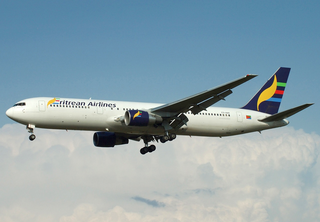
Transport in Eritrea includes highways, airports and seaports, in addition to various forms of public and private vehicular, maritime and aerial transportation.
A free-trade zone (FTZ) is a class of special economic zone. It is a geographic area where goods may be imported, stored, handled, manufactured, or reconfigured and re-exported under specific customs regulation and generally not subject to customs duty. Free trade zones are generally organized around major seaports, international airports, and national frontiers—areas with many geographic advantages for trade.
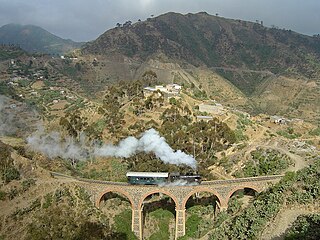
The Eritrean Railway is the only railway system in Eritrea. It was constructed between 1887 and 1932 during the Italian Eritrea colony and connects the port of Massawa with Asmara. Originally it also connected to Bishia. The line was partly damaged by warfare in subsequent decades, but was rebuilt in the 1990s. Vintage equipment is still used on the line.
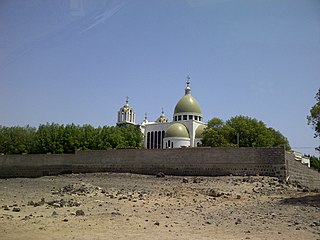
Assab or Aseb is a port city in the Southern Red Sea Region of Eritrea. It is situated on the west coast of the Red Sea. Languages spoken in Assab are predominantly Afar, Tigrinya, and Arabic. After the Italian government took control of the port in 1882, it laid the foundations for the formation of the colony of Italian Eritrea, which became the independent country of Eritrea following its independence from Ethiopia in the 1990s.
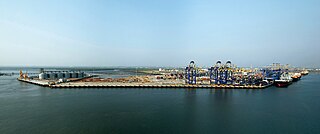
The Port Muhammad Bin Qasim, or Qasim Port Authority, also known as Port Qasim, is a deep-water seaport in Karachi, Sindh, Pakistan, on the coastline of the Arabian Sea under the administrative control of the Secretary to the Government of Pakistan for Maritime Affairs. It is Pakistan's second busiest port, handling about 35% of the nation's cargo. Port Qasim and Karachi Port, the busiest port of the country, together handle almost 90% of all external trade of Pakistan. The remaining maritime trade is routed through Gwadar Port.
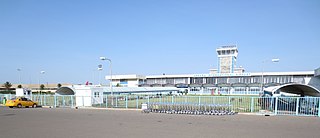
Asmara International Airport is the international airport of Asmara, the capital of Eritrea. It is the country's largest airport and the only one receiving regularly scheduled services as of 2017.
The Wefri Warsay Yika'alo (WWY) or Warsay Yika'alo Program of Eritrea is an ambitious project of post-war recovery. It is similar to other economic recovery programs and is often compared to the Marshall Plan.1, 2, 3

Massawa International Airport is an airport in Massawa, a major city in the Northern Red Sea region of Eritrea. It is considered to be the successor of the Otumlo Airport, also in Massawa, which was destroyed in 1941.
Modern banking in Eritrea started with the arrival of the Italian colonizers. However, from 1974 on, the banking sector became a government monopoly. This situation continued after Eritrea achieved its independence. The Bank of Eritrea is the central bank of Eritrea.
The Eritrean Air Force (ERAF) is the air service branch of the Eritrean Defence Forces.

The Ethiopian Navy, known as the Imperial Ethiopian Navy until 1974, is a branch of the Ethiopian National Defense Force founded in 1955. It was disestablished in 1996 after the independence of Eritrea in 1991 left Ethiopia landlocked. In 2019 the Ethiopian Navy was re-established based in Bahir Dar, Amhara region, near Lake Tana.
The Eritrean Navy is a smaller branch of the Eritrean Defence Forces. It is responsible for the security of the entire coastline of Eritrea, more than 1,100 km, as well as the Eritrean territorial waters.

Eritrea, officially the State of Eritrea, is a country in the Horn of Africa region of Eastern Africa, with its capital and largest city at Asmara. It is bordered by Ethiopia in the south, Sudan in the west, and Djibouti in the southeast. The northeastern and eastern parts of Eritrea have an extensive coastline along the Red Sea. The nation has a total area of approximately 117,600 km2 (45,406 sq mi), and includes the Dahlak Archipelago and several of the Hanish Islands.

Italian Eritrea was a colony of the Kingdom of Italy in the territory of present-day Eritrea. The first Italian establishment in the area was the purchase of Assab by the Rubattino Shipping Company in 1869, which came under government control in 1882. Occupation of Massawa in 1885 and the subsequent expansion of territory would gradually engulf the region and in 1889 borders with the Ethiopian Empire were defined in the Treaty of Wuchale. In 1890 the Colony of Eritrea was officially founded.
Prostitution in Eritrea is legal and regulated. Official figures state there are around 2,000 prostitutes in the country, who are not allowed to operate near schools, hospitals, and churches. According to the 2009 Human Rights Reports, security forces occasionally follow women engaged in prostitution and arrest those who had spent the night with a foreigner. Some women enter prostitution due to poverty. Prostitutes are known locally as "shermuta" in Arabic, or "mnzerma" and "me'amn" in Tigrinya.
KEZAD or Khalifa Economic Zones Abu Dhabi - KEZAD Group was launched by AD Ports Group on September 19, 2022, as part of the plan to consolidate and grow its Economic Cities and Free Zones offering.

The Italo-Ethiopian War of 1887–1889 was an undeclared war between the Kingdom of Italy and the Ethiopian Empire occurring during the Italian colonization of Eritrea. The conflict ended with a treaty of friendship, which delimited the border between Ethiopia and Italian Eritrea but contained clauses whose different interpretations led to another Italo-Ethiopian war.
References
- ↑ "Eritrean Free Zones Proclamation, No. 115 of 2001". www.fao.org. 25 August 2001. Retrieved 2022-01-20.
- 1 2 "Dr. Araya Tsegay, CEO of the Eritrean Free Zone Authority" . Retrieved 2007-03-05.[ dead link ]
- ↑ "Eritrean steam dream of rail link with Sudan" . Retrieved 2007-03-05.